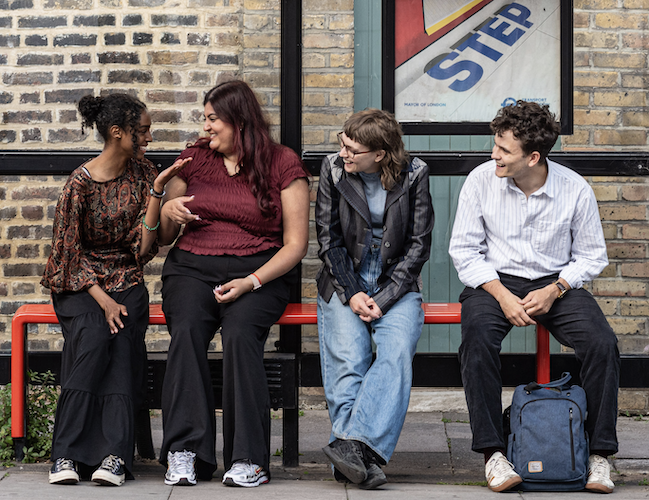Given the growth of populist opposition to green policies, it is a frustrating and perhaps dangerous irony that young people, who will live longest with consequences of the climate crisis, are those least involved in making decisions about it. That engagement gap was the focus of a pioneering, year-long project led by young people in Islington, which reported its findings this week.
It saw four young borough residents teaming up with council policy officers and London School of Economics (LSE) researchers to probe young people’s views on Islington’s “green transition” commitment – broadly, the journey towards social and environmental sustainability, as represented by the council’s Liveable Neighbourhoods programme. This aims to reduce traffic, improve air quality, enhance walking and cycling infrastructure, and create more welcoming public spaces.
There were some stark and sometimes surprising findings. People aged between 16 and 26 had the most to gain from a green transition, the report says, as they are looking ahead to “decades of accelerating climate crisis”. Yet they were “rarely central to local policy design”, almost three in four respondents to the project’s survey had not heard previously heard the phrase “liveable neighbourhoods”, and while 70 per cent wanted more of a say in local decisions, almost 40 per cent said they did not know where to start.
The good news is that the Liveable Neighbourhoods ambition did win the support of a group that also cares deeply about the climate crisis in general. “Young voices are there to be platformed. There are no shortages of opinions!”, the report says. And 74 per cent of those surveyed said addressing climate change and the environmental crisis should be a “top priority” for the council.
That was a nuanced finding, though. For young people preoccupied with cost-of-living and housing problems as well as widespread personal safety worries, the climate crisis was just “one concern on a long list”. High costs and wide income gaps in a borough like Islington were seen as undermining efforts to create neighbourhoods where everyone can live well, which sometimes therefore smacked of “gentrification”. So, 90 per cent of young people wanted climate action to go hand-in-hand with tackling economic and social inequalities. The green transition, they told the researchers, echoing Sir Sadiq Khan, “must be founded on climate justice”.
Safety was another a consistent theme. This was a major concern for young people, especially when walking, cycling or spending time in Islington’s public and green spaces, deterring them from active travel options. Worries about poor lighting, road danger and crime were a “daily concern that shapes how they move, where they go, and how they feel in their communities”.
The threat of bike theft, for example, was given as a major barrier to more cycling, while the perceived safety and convenience as well as the status of car ownership led 47 per cent of respondents to want to own a car in the future, despite driving’s climate and pollution downsides. To many, cars represented “ambition, safety and freedom”. In a borough where nearly 70 per cent of residents do not have access to a car, this was “more positivity…than our research team expected,” the report says.
Overall, as the young participants highlighted at the report’s launch, which took place at the LSE on Tuesday, there were a series of disconnections. Climate change ambitions ran up against the “everyday reality of economic and social inequality,” said Maanya Jones. The climate crisis itself could be “overwhelming and anxiety-inducing,” added Maddy Westhead. The council focused on policy, failing to speak young people’s language or address their pressing concerns about accessibility, safety, affordability and equity.
Young people nevertheless did want to engage with and learn about the local and global implications of the climate crisis, the report found. But relevance was key. As well as the climate imperative, other elements of the green transition, such as socio-economic and racial justice, mental health benefits, or green skills and jobs, should be given more prominence.
That was a core message, the report concluded. “Issues of safety, affordability and community are not secondary to environmental goals; they are foundational to them. A cycle lane is only useful if people feel safe enough to use it. A park is only beneficial if it feels welcoming to all. A climate policy is only effective if the people it is meant to serve can afford to prioritise it.”
What is the way forward? The report’s recommendations range from Islington-specific suggestions to broader points – linking green transition programmes to the “everyday realities” of economic and social inequality in London, meeting young people “where they are” and avoiding jargon. City Hall could also help boost understanding of climate risk, the causes of the climate crisis and ways to address it by developing education programmes across the capital.
There were wider implications too, LSE senior policy fellow Catarina Heeckt said at the report launch. Populist political turbulence was increasingly putting climate action on the “front line of the culture wars,” she said. Specific “place-based” insights, as set out in the report, promoting “real local ownership” and grounding climate action in the “day to day” were vital in combating that threat.
The full research report is available on the LSE website here.
OnLondon.co.uk provides unique coverage of the capital’s politics, development and culture with no paywall and no ads. The vast majority of its income comes from individual supporters, who pay £5 a month or £50 a year. They receive in return exclusive newsletters, bargain London event offers and much gratitude. Details HERE. Follow Charles Wright on Bluesky. Photo from LSE report.

